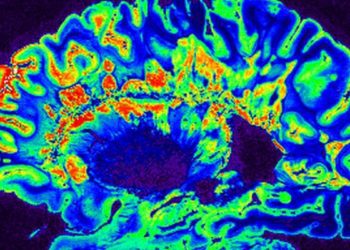“No Evidence of Disease Activity” may be useful goal in multiple sclerosis
1. Status of “No Evidence of Disease Activity” or NEDA is defined as no new clinical or radiographic evidence of multiple sclerosis (MS) disease progression.
2. NEDA at 2 years of follow-up had a positive predictive value of 78.3% for no progression at 7 years. Thus, NEDA status may represent a useful outcome measure in describing the prognosis and treatment of MS.
Evidence Rating Level: 2 (Good)
Study Rundown: As a means of assessing prognosis and treatment efficacy for multiple sclerosis (MS), this study hypothesized that a clinical status of “no evidence of disease activity” (NEDA) would provide a useful outcome measure. NEDA is defined as the absence of new or enlarging T2 or T1 gadolinium-enhancing lesions on MRI, and no clinical relapse or sustained increased score on the Expanded Disability Status Scale (EDSS). This study sought to follow a cohort of patients with relapsing-remitting MS over the course of seven years. They were seen in clinic every six months, and underwent an MRI study annually.
The study found that NEDA at 2 years predicted NEDA at 5 years, as well as the level of disability patients experienced after 7 years of follow-up. NEDA is a combined measure, incorporating both clinical and radiographic information, and this study suggests that as an outcome measure it is more effective than any one variable alone. The large, diverse cohort in this study will be studied on an ongoing basis by the authors and their collaborators. In the future, it may be useful to incorporate biomarkers in blood and cerebrospinal fluid into the NEDA measure as well in order to better refine the definition of this variable.
Click to read the study, published today in JAMA Neurology
Relevant Reading: Disease Activity Free Status: A New End Point for a New Era in Multiple Sclerosis Clinical Research?
In-Depth [prospective cohort]: Patients were selected from the Comprehensive Longitudinal Investigation of Multiple Sclerosis at Brigham and Women’s Hospital (CLIMB) cohort. These patients had a minimum of 7 years of prospective follow-up with yearly brain MRI and biannual clinic visits. Ultimately, 219 patients between 18 to 65 years of age were recruited. Clinical examinations and EDSS scores were performed at 6-month intervals. In this study, relapse was defined as new symptoms or signs that lasted for more than 24 hours without other likely cause. EDSS score increases of more than one that persisted over two clinical visits were classified as representing progression of the disease.
At one year, 99 of 215 patients included in final analysis met NEDA criteria (i.e., no clinical or radiographic disease activity, described further above). At 2 years, 60 of 218 patients still met NEDA status. Only 17 of 216 patients met NEDA status at 7 years. The positive predictive value of NEDA status in predicting absence of disease progression or no change in EDSS at 7 years was 71.7% at 1 year and 78.3% at 2 years. There were no differences found for patients determined to have established disease as compared to early disease.
More from this author: Hyperbaric oxygen does not significantly improve post-concussion symptoms, Increased orexin levels linked with poor sleep quality in Alzheimer Disease, Antibiotic prescription patterns in China may contribute to resistance, Glatiramer acetate (Copaxone) therapy may alter B cell function in multiple sclerosis
Image: CC/Oliver Stollmann
©2014 2 Minute Medicine, Inc. All rights reserved. No works may be reproduced without expressed written consent from 2 Minute Medicine, Inc. No article should be construed as medical advice and is not intended as such by the authors, editors, staff or by 2 Minute Medicine, Inc.






